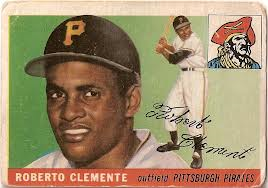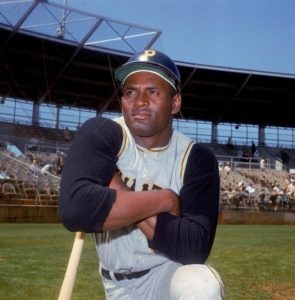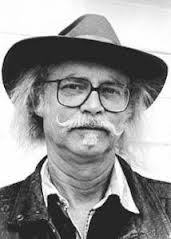 Major League Baseball is paying tribute to the late Roberto Clemente, a great ballplayer and an even greater humanitarian. In a post about the late writer, W.P. Kinsella (author of “Field of Dreams”), I had included excerpts from one of his short stories, “Searching For January,” a tale of magical realism about Clemente. I am presenting it here once again.
Major League Baseball is paying tribute to the late Roberto Clemente, a great ballplayer and an even greater humanitarian. In a post about the late writer, W.P. Kinsella (author of “Field of Dreams”), I had included excerpts from one of his short stories, “Searching For January,” a tale of magical realism about Clemente. I am presenting it here once again.
A small taste of Kinsella’s prose (his words in italics): I could share any one of dozens of his short stories, but the one I’ve chosen—among the shortest and one of my favorites—is titled “Searching for January,” which appeared in a collection called The Dixon Cornbelt League and Other Baseball Stories. The true backstory: on New Year’s Eve 1972 the great Pittsburgh Pirates outfielder, Roberto Clemente boarded a plane in his native Puerto Rico on a mercy mission to deliver aid to earthquake-ravaged Nicaragua. The plane crashed at sea and his body was never found.

Roberto Clemente
The story opens in 1987. The unnamed narrator is walking along an unnamed (probably Caribbean) beach: The sand is white as salt but powdery as icing sugar, cool on my bare feet, although if I push my toes down a few inches, yesterday’s heat lurks, waiting to surface with the sun.
He spots a raft at sea, its occupant waving at him. The man in the raft is Clemente, and he says that he is the sole survivor of a crash that occurred—only a few days ago. The narrator, a fan, agrees that he looks like the Clemente of fifteen years ago, age thirty-eight then, but how can this be? His beard is little more than five days’ growth.
The narrator shows him the date on his driver’s license and a 1987 pocket schedule for the Seattle Mariners, a team that did not exist in 1972. Trying to get his head around all of this, Clemente details what happened before and after the accident. Then he says, “But my wife, my family. Will they all be fifteen years older?” The narrator answers in the affirmative. “My kids grown up?” Indeed.
All of his old teammates have retired too. And his Pirates? “Gone to hell in a handbasket,” the narrator says.
So Clemente ponders a while, looks at a path leading to a hotel. Comfort and food. Finally he says, “If I walk up that path, and if the world is as you say—and I think I believe you—I will become a curiosity. The media will swarm over me unlike anything I’ve ever known.”

W.P. Kinsella
Ya think? Some things never change. Clemente decides that his choices are all or nothing, the nothing being, “To continue the search.” But how? the narrator wonders.
“I’ve searched for a few days and already found 1987. Time has tricked me some way. Perhaps if I continue searching for January 1973, I’ll find it.”
They discuss other possibilities, and then Clemente says, “I am destined to be found, maybe even on this beach, but fifteen years in your past. I intend to be found. I’ll keep searching for January.”
He pushes the raft back out to sea and climbs in. The narrator: I watch him drift. Trapped. Or am I trapped, here in 1987, while he, through some malfunction of the universe, is borne into timelessness? What if I were to accompany him?
“Wait!” I call. “There’s something…”
But Clemente had already drifted beyond hearing. I watch as he paddles, his back broad and strong. Just as the mist is about to engulf him, as ocean, fog, and sky merge, he waves his oar once, holding it like a baseball bat, thrusting it at the soft, white sky.
A beautiful, touching story—rather sad, when you think of it. How many baseball fans—how many people in general—would have hoped for Clemente to come floating up on a beach—IN JANUARY 1973? This is the gift of W.P. Kinsella, where baseball and magical realism come together.
